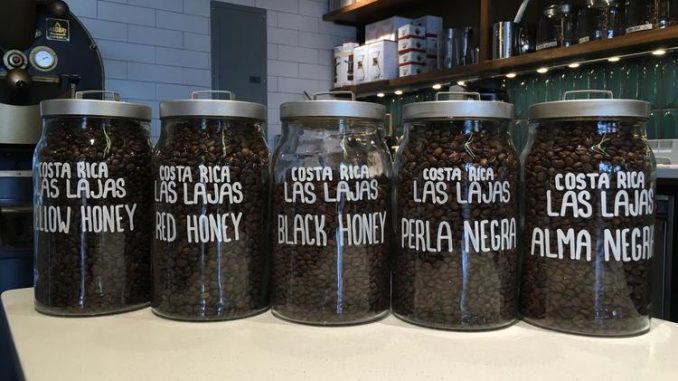
The five processing techniques used by Las Lajas will be on offer tonight at Case Study Coffee
FROM STAFF REPORTS
Christine and Wes of Case Study Coffee Roasters in Portland love taking risks and doing things in their own unique way ”their westside cafe by Portland State University, for example, is where you can find one of the only Synessos tricked out with the company’s awesome MVP technology, for example. But their commitment to the exceptional coffees they serve in their three Portland, Ore., cafes is what truly makes them stand out.
This couldn’t be better exemplified than the event Case Study is hosting at their Alberta Street cafe tonight (1422 NE Alberta): A celebration of the many processing techniques that Francisca and Oscar Chacon of Finca Las Lajas in Costa Rica have become famous for. At the event tonight at 6 p.m., you can taste all five processes side by side. They’ll also be serving up coffee tonics made with gin and La Lajas’ Perla Negra. Everyone’s invited, and the event is free.

And if you want to keep tasting these processes at home, Case Study will be selling half-sized retail bags of each process.
Christine visited Las Lajas herself and was super impressed by what she saw. She wrote eloquently about it on Case Study’s blog:
The Chacon family’s farm is certified organic, as is their mill. Beyond that, they use the unique weather patterns created by their location between two volcanos to the east, and the Pacific Ocean to the west, in making decisions about how particular lots of coffee will be processed. On overcast days they will leave the pulp on the milled coffee cherries for their honey-processed lots, and on sunny days they will utilize a more “washed” technique, where the mucilage is mostly removed from the milled coffee before drying.
For the honey-processed lots featured at Case Study, three drying methods are implemented to achieve different results in the final product. All honeyed coffee is taken to the raised drying beds (pictured below) and covered overnight. After the covers are removed in the morning, the differences in treatment begin. The Yellow Honey coffee is turned first thing in the morning, and multiple times throughout the day. The Red Honey coffee is left undisturbed until the afternoon, at which point it is turned. The Black Honey coffee is achieved by leaving the honeyed coffee all day, and another entire night without turning.

In addition to honeyed lots, Las Lajas also produced two naturally processed coffees which are featured at Case Study: Perla Negra and Alma Negra. These coffees are not run through their wet mill, but are taken to the drying beds with the fruit left intact. Similar to the honeyed coffees, the differences between the naturally processed coffees has to do with how often they are turned on the drying beds; Perla Negra is turned more often, and the Alma Negra is only turned a few times a day.

The differences between these processing methods in the final cup are remarkable. Most notably, the less the coffees are turned on the beds, the coffees gain a heavier body, and the fruit notes resemble more candied and/or cooked fruit. Obviously the addition of the fruit skin of the naturals also contributes to these flavors and heavier body. The more the coffee is turned, as in the Yellow Honey and the Perla Negra, the more transparent the flavors become, and the more pronounced the acidity.
Christine took this video of Francisca explaining her processing methods. Features is Luis Arocha of Café Imports translating:

